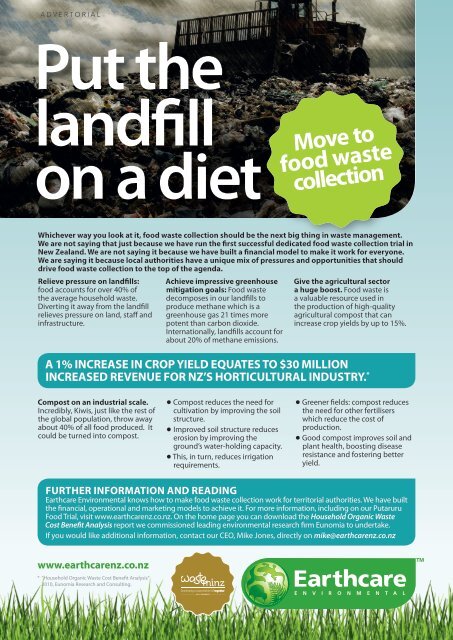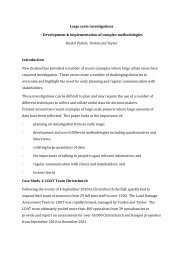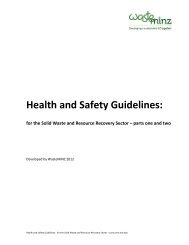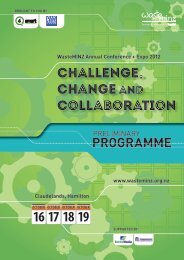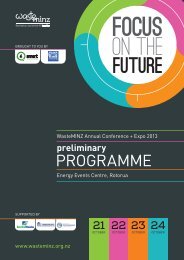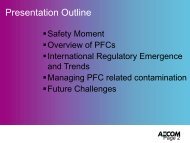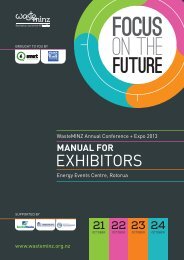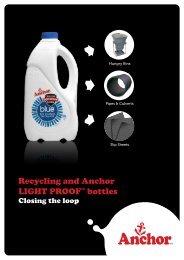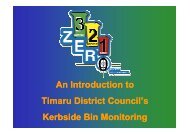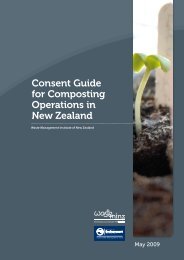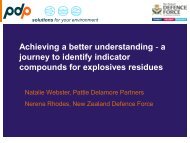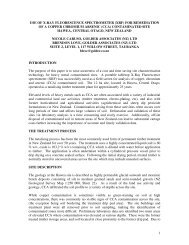Kaibosh
e-WasteAwareness March 2013 - WasteMINZ
e-WasteAwareness March 2013 - WasteMINZ
- No tags were found...
Create successful ePaper yourself
Turn your PDF publications into a flip-book with our unique Google optimized e-Paper software.
a d v e r t o r i a l<br />
Put the<br />
landfill<br />
on a diet<br />
Move to<br />
food waste<br />
collection<br />
Whichever way you look at it, food waste collection should be the next big thing in waste management.<br />
We are not saying that just because we have run the first successful dedicated food waste collection trial in<br />
New Zealand. We are not saying it because we have built a financial model to make it work for everyone.<br />
We are saying it because local authorities have a unique mix of pressures and opportunities that should<br />
drive food waste collection to the top of the agenda.<br />
Relieve pressure on landfills:<br />
food accounts for over 40% of<br />
the average household waste.<br />
Diverting it away from the landfill<br />
relieves pressure on land, staff and<br />
infrastructure.<br />
Achieve impressive greenhouse<br />
mitigation goals: Food waste<br />
decomposes in our landfills to<br />
produce methane which is a<br />
greenhouse gas 21 times more<br />
potent than carbon dioxide.<br />
Internationally, landfills account for<br />
about 20% of methane emissions.<br />
Give the agricultural sector<br />
a huge boost. Food waste is<br />
a valuable resource used in<br />
the production of high-quality<br />
agricultural compost that can<br />
increase crop yields by up to 15%.<br />
A 1% iNCReAse iN CRop yield equAtes to $30 MillioN<br />
iNCReAsed ReveNue FoR NZ’s hoRtiCultuRAl iNdustRy. *<br />
Compost on an industrial scale.<br />
Incredibly, Kiwis, just like the rest of<br />
the global population, throw away<br />
about 40% of all food produced. It<br />
could be turned into compost.<br />
●●Compost reduces the need for<br />
cultivation by improving the soil<br />
structure.<br />
●●<br />
Improved soil structure reduces<br />
erosion by improving the<br />
ground’s water-holding capacity.<br />
●●This, in turn, reduces irrigation<br />
requirements.<br />
●●Greener fields: compost reduces<br />
the need for other fertilisers<br />
which reduce the cost of<br />
production.<br />
●●Good compost improves soil and<br />
plant health, boosting disease<br />
resistance and fostering better<br />
yield.<br />
FuRtheR iNFoRMAtioN ANd ReAdiNG<br />
Earthcare Environmental knows how to make food waste collection work for territorial authorities. We have built<br />
the financial, operational and marketing models to achieve it. For more information, including on our Putaruru<br />
Food Trial, visit www.earthcarenz.co.nz. On the home page you can download the Household Organic Waste<br />
Cost Benefit Analysis report we commissioned leading environmental research firm Eunomia to undertake.<br />
If you would like additional information, contact our CEO, Mike Jones, directly on mike@earthcarenz.co.nz<br />
www.earthcarenz.co.nz<br />
* “Household Organic Waste Cost Benefit Analysis”<br />
2010, Eunomia Research and Consulting.<br />
mar 2013 \ WWW.WASTEMINZ.ORG.NZ \ 15


